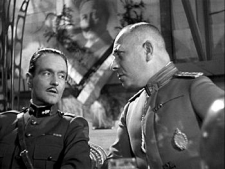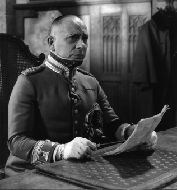Is It Really a Great Movie? Part Three: Grand Illusion
by dan heaton

Using Roger Ebert's Great Movies book as a guide, this series of articles will focus on all films included on his list that previously have escaped my notice. Since all lists are subjective, I am not treating Ebert's choices as the essential selection of films. However, his essays offer the perfect chance for me to explore both classics and lesser-known pictures from around the globe.
My third series entry takes us into World War I German prison camps for Jean Renoir’s Grand Illusion (1937), one of the few foreign-language films to receive a Best Picture nomination. At the Venice Film Festival, Renoir (Rules of the Game) received recognition for the Best Overall Artistic Contribution. The antiwar film also earned best foreign film awards from the National Board of Review and the New York Film Critics Circle. This picture is unique because it was considered lost for many years. Apparently destroyed during the German invasion in World War II, the original negative was not discovered until the ‘90s, when a restoration provided it for a new generation of film audiences.
Jean Gabin stars as Lieutenant Marechal, a charismatic mechanic fighting for the French army during the war. While traveling with the aristocratic pilot Captain de Boeldieu (Pierre Fresnay), their plane is shot down by the Germans, leading to their capture. Their experiences at the prison camp are actually quite pleasant, with acceptable food and some minor freedom of movement. This gives them a chance to attempt several escapes, with unfortunate results. A transfer to a second prison brings Boeldieu into contact with Captain von Rauffenstein (Erich von Stronheim), a fellow upper-class guy who admires the French captain. A strange-looking figure with a cracked spine and eyeglass, the German officer conveys a surprising amount of humanity. The apparent enemies actually converse as equals and have frank discussions about life beyond the current war. Meanwhile, Marechal and the Jewish banker Rosenthal (Marcel Dalio) continue to search for a way to escape, which could place Boeldieu’s life into jeopardy.

Although it was created in the late ’30s, Grand Illusion offers a surprising tale of humanity from both sides of the wartime setting. Renoir and Writer Charles Spaak hardly seem interested in the conflict and instead focus on the personalities of the French prisoners and their captors. The story gives a direct statement against war without displaying any over-the-top statements from its lead characters. Presenting everyone as an actual person makes it difficult for us to appreciate any killings during the war. In the final act, Marechal encounters a German woman who has nearly lost her entire family to the war. The effects of the conflict on the enemy’s citizens are rarely shown in the typical propaganda (good vs. evil) war film of the era. Renoir bypasses the expected scenes and paints a broader than expected wartime environment.
Unfortunately, this successful tone does not generate a very interesting viewing experience. The story moves along much too slowly and fails to really get moving until we arrive at Rauffenstein’s prison. There is nothing particularly wrong about watching the French soldiers talk and eat for an hour, but it fails to provide any truly memorable scenes. Jean Gabin conveys an appealing screen presence as Marechal, but he can only do so much within the slow-moving plot. Pierre Fresnay is stuffy until he’s able to work with Erich von Stronheim, and even their scenes take a backseat to plans of yet another escape attempt. The two-hour running time feels much longer, and its final detour would be more compelling if it had occurred earlier.
Roger Ebert describes Grand Illusion as a “meditation on the collapse of the old order of European civilization.” His argument builds a convincing case for Renoir’s dissection of the class differences between the soldiers and the damage caused by World War I. However, I do not agree that this exploration places the film into the great movie category. Pulled away from the historical background, the movie does not stand on its own as a grand piece of cinema. There are several great scenes that provide interesting character interaction, but the overall result is underwhelming. While choosing this film for your next movie night shouldn’t disappoint, it does fall a bit short of warranting the exalted status.
Copyright (c) 2006 erasing clouds |
|